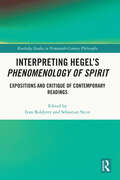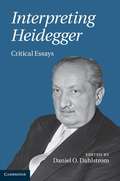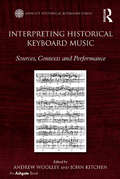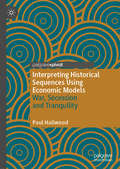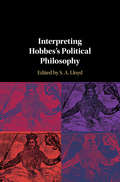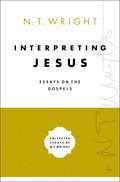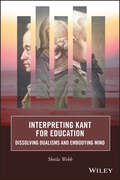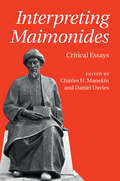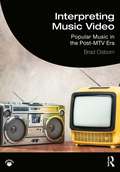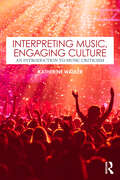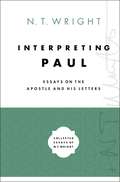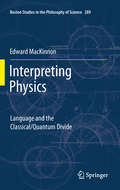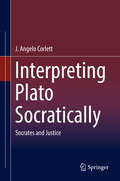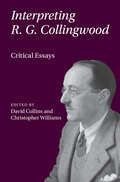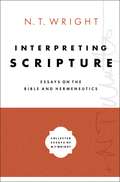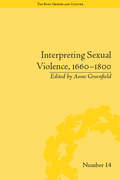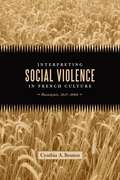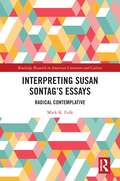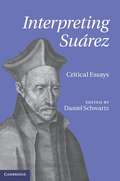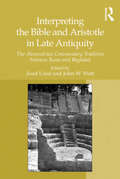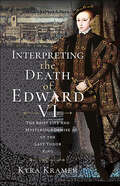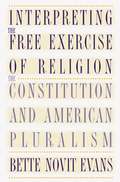- Table View
- List View
Interpreting Hegel’s Phenomenology of Spirit: Expositions and Critique of Contemporary Readings (Routledge Studies in Nineteenth-Century Philosophy)
by Ivan Boldyrev Sebastian SteinThis book focuses on the interpretations of Hegel’s Phenomenology of Spirit that have proved influential over the past decades. Current readers of Hegel’s Phenomenology face an abundance of interpretive literature devoted to this difficult text and confront a plethora of different philosophical presuppositions, research strategies and hermeneutic efforts.To enable a better orientation within the interpretative landscape, the essays in this volume summarize, contextualize and critically comment on the issues and currents in contemporary Phenomenology scholarship. There is a common set of three questions that each of the contributions seeks to answer: (1) What kind of text is The Phenomenology of Spirit? (2) What do the different strategies of interpretation conceptually bring to the text? (3) How do different interpreters justify their verdict on whether the Phenomenology is still a viable project?
Interpreting Heidegger
by Daniel O. DahlstromThis volume of essays by internationally prominent scholars interprets the full range of Heidegger's thought and major critical interpretations of it. It explores such central themes as hermeneutics, facticity and Ereignis, conscience in Being and Time, freedom in the writings of his period of transition from fundamental ontology, and his mature criticisms of metaphysics and ontotheology. The volume also examines Heidegger's interpretations of other authors, the philosophers Aristotle, Kant and Nietzsche and the poets Rilke, Trakl and George. A final group of essays interprets the critical reception of Heidegger's thought, both in the analytic tradition (Ryle, Carnap, Rorty and Dreyfus) and in France (Derrida and Lévinas). This rich and wide-ranging collection will appeal to all who are interested in the themes, the development and the context of Heidegger's philosophical thought.
Interpreting Heidegger: Critical Essays
by Daniel O. DahlstromThis volume of essays by internationally prominent scholars interprets the full range of Heidegger's thought and major critical interpretations of it. It explores such central themes as hermeneutics, facticity and Ereignis, conscience in Being and Time, freedom in the writings of his period of transition from fundamental ontology, and his mature criticisms of metaphysics and ontotheology. The volume also examines Heidegger's interpretations of other authors, the philosophers Aristotle, Kant and Nietzsche and the poets Rilke, Trakl and George. A final group of essays interprets the critical reception of Heidegger's thought, both in the analytic tradition (Ryle, Carnap, Rorty and Dreyfus) and in France (Derrida and Lèvinas). This rich and wide-ranging collection will appeal to all who are interested in the themes, the development and the context of Heidegger's philosophical thought.
Interpreting Historical Keyboard Music: Sources, Contexts and Performance (Ashgate Historical Keyboard Series)
by Andrew Woolley John KitchenResearch in the field of keyboard studies, especially when intimately connected with issues of performance, is often concerned with the immediate working environments and practices of musicians of the past. An important pedagogical tool, the keyboard has served as the ’workbench’ of countless musicians over the centuries. In the process it has shaped the ways in which many historical musicians achieved their aspirations and went about meeting creative challenges. In recent decades interest has turned towards a contextualized understanding of creative processes in music, and keyboard studies appears well placed to contribute to the exploration of this wider concern. The nineteen essays collected here encompass the range of research in the field, bringing together contributions from performers, organologists and music historians. Questions relevant to issues of creative practice in various historical contexts, and of interpretative issues faced today, form a guiding thread. Its scope is wide-ranging, with contributions covering the mid-sixteenth to early twentieth century. It is also inclusive, encompassing the diverse range of approaches to the field of contemporary keyboard studies. Collectively the essays form a survey of the ways in which the study of keyboard performance can enrich our understanding of musical life in a given period.
Interpreting Historical Sequences Using Economic Models: War, Secession and Tranquility
by Paul HallwoodThis Palgrave Pivot presents theoretical models that explain common historical sequences, such as wars of secession, the rise and fall of empires, and international war. The book uses a rational choice model to frame the incentives of specific groups coming together in a polity or leaving it. These incentives are then set in a theoretical framework to determine the outcome—unity or secession, peace or war—and are demonstrated through historical examples. The book provides two longer case studies looking directly at motives for and against secession: the first on the American Civil War from the point of view of the Confederacy, and the second on efforts by the UK government to stem the tide of Scottish independence. Another case study discusses peacekeeping as aimed at reducing the costs of secessionist wars. With its accessible use of economic theory and ability to bring to life real-world examples of conflict and secession, this book is ideal supplementary reading for courses in international relations, conflict studies, global economics and economic history.
Interpreting Hobbes's Political Philosophy
by S. A. LloydThe essays in this volume provide a state-of-the-art overview of the central elements of Hobbes's political philosophy and the ways in which they can be interpreted. The volume's contributors offer their own interpretations of Hobbes's philosophical method, his materialism, his psychological theory and moral theory, and his views on benevolence, law and civil liberties, religion, and women. Hobbes's ideas of authorization and representation, his use of the 'state of nature', and his reply to the unjust 'Foole' are also critically analyzed. The essays will help readers to orient themselves in the complex scholarly literature while also offering groundbreaking arguments and innovative interpretations. The volume as a whole will facilitate new insights into Hobbes's political theory, enabling readers to consider key elements of his thought from multiple perspectives and to select and combine them to form their own interpretations of his political philosophy.
Interpreting Jesus: Essays on the Gospels (Collected Essays of N. T. Wright #2)
by N. T. WrightDraws together the most important articles on Jesus and the gospels by distinguished scholar and author N. T. Wright. Interpreting Jesus puts into one volume the development of Wright's thought on this subject over the last three decades. It collects the essays—written for a wide variety of publications—that led up to his groundbreaking book Jesus and the Victory of God, and it includes such wide-ranging themes as:The Biblical Roots of Trinitarian TheologyThe History, Eschatology, and New Creation in John's GospelThe Evangelists' Use of the Old Testament as an Implicit Overarching NarrativeAnd The Public Meaning of the GospelsInterpreting Jesus displays Wright's engaging prose, his courage to go where few have gone, and his joy to bridge the work of the academy and the church.Here is a rich feast for any serious student of the Bible, especially of the New Testament. Detailed, incisive, and exquisitely nuanced exegesis, this collection will reward you with a clearer, deeper, and more informed appreciation of the recent advances in Jesus studies, and their significance for theology today.Many of the included studies have never been published or were made available only in hard-to-find larger volumes and journals.
Interpreting Kant for Education: Dissolving Dualisms and Embodying Mind (Journal of Philosophy of Education)
by Sheila WebbINTERPRETING KANT FOR EDUCATION No thinker in the modern world has laid the way for the development of philosophy so influentially as Immanuel Kant, and it is hard to think of the philosophy of education without some sense of Kant in the background. Yet simplified exegeses and synoptic accounts abound, making for a ‘Kantian’ picture that readily succumbs to caricature. Interpreting Kant for Education exposes the errors in this picture. Through a spiralling series of arguments, Sheila Webb dismantles the sclerotic dualisms of fact and value, subject and object, and body and mind that have done so much to hamper appreciation of Kant and to harm education. This ground-breaking work in the philosophy of education allows a reappraisal of Kant; it plays its part in the reengagement with Kant in the wider analytic tradition and provides a secure footing for better research and practice in education.
Interpreting Maimonides: Critical Essays
by Charles H. Manekin Daniel DaviesMoses Maimonides (1138–1204) was arguably the single most important Jewish thinker of the Middle Ages, with an impact on the later Jewish tradition that was unparalleled by any of his contemporaries. In this volume of new essays, world-leading scholars address themes relevant to his philosophical outlook, including his relationship with his Islamicate surroundings and the impact of his work on subsequent Jewish and Christian writings, as well as his reception in twentieth-century scholarship. The essays also address the nature and aim of Maimonides' philosophical writing, including its connection with biblical exegesis, and the philosophical and theological arguments that are central to his work, such as revelation, ritual, divine providence, and teleology. Wide-ranging and fully up-to-date, the volume will be highly valuable for those interested in Jewish history and thought, medieval philosophy, and religious studies.
Interpreting Music Video: Popular Music in the Post-MTV Era
by Brad OsbornInterpreting Music Video introduces students to the musical, visual, and sociological aspects of music videos, enabling them to critically analyze a multimedia form with a central place in popular culture. With highly relevant examples drawn from recent music videos across many different genres, this concise and accessible book brings together tools from musical analysis, film and media studies, gender and sexuality studies, and critical race studies, requiring no previous knowledge. Exploring the multiple dimensions of music videos, this book is the perfect introduction to critical analysis for music, media studies, communications, and popular culture.
Interpreting Music, Engaging Culture: An Introduction to Music Criticism
by Katherine WalkerInterpreting Music, Engaging Culture: An Introduction to Music Criticism offers a clear, hands-on guide for emerging music critics that brings together aesthetics, critical theory, and practical music criticism in an accessible format. Over the course of the book, readers develop a vocabulary and framework for criticizing music of all kinds and for various media while learning how to connect music to its cultural, social, and political contexts.Excerpts from primary sources throughout provide a wide range of writing examples, while Chapters address the distinct challenges of describing and interpreting music for various media and in diverse formats. Along the way, the book explores questions at the core of music and its criticism, such as what constitutes a musical work and what makes a piece of music “authentic”; it also introduces critical lenses, including feminist and queer criticism, postcolonialism and critical race theory, as well as the analysis of music in consumer culture. Addressing both classical and popular music criticism, Interpreting Music, Engaging Culture is a comprehensive and lively textbook that enables students to uncover, articulate, and analyze what makes music compelling and meaningful.
Interpreting Paul: Essays on the Apostle and His Letters (Collected Essays of N. T. Wright #3)
by N. T. WrightDraws together the most important articles on Paul and his letters by distinguished scholar and author N. T. Wright. Interpreting Paul puts into one volume Wright's most important articles on the Apostle over the last six years. It collects the essays—written for a wide variety of publications—that further his detailed reflections on Paul since the publication of his magisterial Paul and the Faithfulness of God, including such diverse investigations as:How and Why Paul Invented 'Christian Theology'How Greek was Paul's Eschatology?Paul and Missional HermeneuticsThe Challenge of Fraternity in PaulInterpreting Paul displays Wright's engaging prose, his courage to go where few have gone, and his joy to bridge the work of the academy and the church.Here is a rich feast for any serious student of the Bible, especially of the New Testament. Detailed, incisive, and exquisitely nuanced exegesis, this collection will reward you with a clearer, deeper, and more informed appreciation of Paul and the relevance of his teaching to Christian life and thought today.Many of the included studies have never been published or were made available only in hard-to-find larger volumes and journals.
Interpreting Physics
by Edward MackinnonThis book is the first to offer a systematic account of the role of language in the development and interpretation of physics. An historical-conceptual analysis of the co-evolution of mathematical and physical concepts leads to the classical/quatum interface. Bohrian orthodoxy stresses the indispensability of classical concepts and the functional role of mathematics. This book analyses ways of extending, and then going beyond this orthodoxy orthodoxy. Finally, the book analyzes how a revised interpretation of physics impacts on basic philosophical issues: conceptual revolutions, realism, and reductionism.
Interpreting Plato Socratically: Socrates And Justice
by J. Angelo CorlettJ. Angelo Corlett’s new book, Interpreting Plato Socratically continues the critical discussion of the Platonic Question where Corlett’s book, Interpreting Plato’s Dialogues concluded. New arguments in favor of the Mouthpiece Interpretation of Plato’s works are considered and shown to be fallacious, as are new objections to some competing approaches to Plato’s works.The Platonic Question is the problem of how to approach and interpret Plato’s writings most of which are dialogues. How, if at all, can Plato’s beliefs, doctrines, theories and such be extracted from dialogues where there is no direct indication from Plato that his own views are even to be found therein? Most philosophers of Plato attempt to decipher from Plato’s texts seemingly all manner of ideas expressed by Socrates which they then attribute to Plato. They seek to ascribe to Plato particular views about justice, art, love, virtue, knowledge, and the like because, they believe, Socrates is Plato’s mouthpiece through the dialogues. But is such an approach justified? What are the arguments in favor of such an approach? Is there a viable alternative approach to Plato’s dialogues?In this rigorous account of the dominant approach to Plato’s dialogues, there is no room left for reasonable doubt about the problematic reasons given for the notion that Plato’s dialogues reveal either Plato’s or Socrates’ beliefs, doctrines or theories about substantive philosophical matters.Corlett’s approach to Plato’s dialogues is applied to a variety of passages throughout Plato’s works on a wide range of topics concerning justice. In-depth discussions of themes such as legal obligation, punishment and compensatory justice are clarified and with some surprising results. Plato’s works serve as a rich source of philosophical thinking about such matters. A central question in today’s Platonic studies is whether Socrates, or any other protagonist in the dialogues, presents views that the author wanted to assert or defend. Professor Corlett offers a detailed defense of his view that the role of Socrates is to raise questions rather than to provide the author’s answers to them. This defense is timely as intellectual historians consider the part played by Academic scholars centuries after Plato in systematizing Platonism. J. J. Mulhern, University of Pennsylvania
Interpreting Proclus
by Stephen GershThis is the first book to provide an account of the influence of Proclus, a member of the Athenian Neoplatonic School, during more than one thousand years of European history (ca 500-1600). Proclus was the most important philosopher of late antiquity, a dominant (albeit controversial) voice in Byzantine thought, the second most influential Greek philosopher in the later western Middle Ages (after Aristotle), and a major figure (together with Plotinus) in the revival of Greek philosophy in the Renaissance. Proclus was also intensively studied in the Islamic world of the Middle Ages and was a major influence on the thought of medieval Georgia. The volume begins with a substantial essay by the editor summarizing the entire history of Proclus' reception. This is followed by the essays of more than a dozen of the world's leading authorities in the various specific areas covered.
Interpreting R. G. Collingwood: Critical Essays
by David Collins Christopher WilliamsAn indisputably prominent figure in twentieth-century philosophy, R. G. Collingwood often remains elusive even to those who admire his achievements. This volume of new essays aims to reintroduce Collingwood to twenty-first-century philosophical readers and to show why, and how, his achievements matter. Each essay offers an original contribution to the understanding of some aspect of Collingwood's thought, including new interpretations of several of his central ideas, re-examinations of his place in twentieth-century philosophy, and an extended consideration of a previously undiscussed manuscript. The essays span the wide range of Collingwood's interests, including metaphysics, epistemology, logic, philosophy of mind, aesthetics, and political philosophy, as well as Roman British history and the history of art. Emphasis is placed on Collingwood's connections to traditions with which his name is not typically linked, including pragmatism, analytic philosophy, and phenomenology. This rich volume will stimulate further examination of Collingwood and his legacy.
Interpreting Schelling
by Lara OstaricThis book is the first collection of essays on Schelling in English that systematically explores the historical development of his philosophy. It addresses all four periods of Schelling's thought: his Transcendental Philosophy and Philosophy of Nature, his System of Identity [Identitätsphilosophie], his System of Freedom, and his Positive Philosophy. The essays examine the constellation of philosophical ideas that motivated the formation of Schelling's thought, as well as those later ones for which his philosophy laid the foundation. They therefore relate Schelling's philosophy to a broad range of systematic issues that are of importance to us today: metaphysics, epistemology, aesthetics, ethics, our modern conceptions of individual autonomy, philosophy of history, philosophy of religion, political philosophy, and theology. The result is a new interpretation of Schelling's place in the history of German Idealism as an inventive and productive thinker.
Interpreting Scripture: Essays on the Bible and Hermeneutics (Collected Essays of N. T. Wright #1)
by N. T. WrightDraws together the most important articles on Scripture and hermeneutics by distinguished scholar and author N. T. Wright. Interpreting Scripture brings together into one volume Wright's self-selected, key lectures, papers, and reflections on topics of scriptural interpretation, including:The Lord's Prayer as a Paradigm of Christian PrayerChristian Origins and the Question of GodFaith, Virtue, Justification, and the Journey to FreedomRevelation and Christian Hope: Political Implications of the Revelation to JohnApocalyptic and the Sudden Fulfilment of Divine Promise…and many more.Interpreting Scripture displays Wright's engaging prose, his courage to go where few have gone, and his joy to bridge the work of the academy and the church. Here is a rich feast for any serious student of the Bible, especially of the New Testament. Detailed, incisive, and exquisitely nuanced exegesis, this collection will reward you with a clearer, deeper, and more informed appreciation of Scripture and its application to Christian life and thought today.Many of the included studies have never been published or were made available only in hard-to-find larger volumes and journals.
Interpreting Sexual Violence, 1660–1800 ("The Body, Gender and Culture" #14)
by Anne GreenfieldThe essays in this collection explore representations of and responses to sexual violence over the course of the long eighteenth century. Contributors examine the underlying ideologies that spawned these representations, confronting the social, political, legal and aesthetic conditions of the day.
Interpreting Social Violence in French Culture: Buzançais, 1847-2008
by Cynthia A. BoutonIn January 1847, a grain convoy passed through Buzançais, an obscure village in a remote region of central France that was suffering from hunger, high prices, and widespread unemployment. Villagers intercepted the shipment, invaded granaries and mills, and forced resale of the grain at a just price set by the people. What started as a classic subsistence movement, however, triggered two days of rioting and class hostility punctuated by uncommon property damage and death. Disorder soon spread throughout the region. The Buzançais riot quickly became an evocative symbol of the rights of the people, and stories about the riot have survived into the twenty-first century. In Interpreting Social Violence in French Culture, Cynthia A. Bouton traces how the production and marketing of the Buzançais riot story served political commentators, publishers, authors, illustrators, and local enthusiasts, enabling them to draw upon key points from the 1847 uprising to negotiate issues relevant to their own times. Bouton argues that over time, especially from the 1970s, the persistent integration of stories of social protest into a widening variety of media has helped shape French political identity as one in which the politics of the street has become as customary as the politics of political assemblies.Bouton examines representations of the riot in newspapers, novels, illustrations, popular and scholarly historical narratives, cartoons, television, local spectacles, and on the Internet. She analyzes power relations embedded in texts and in images; the ways in which texts and images complement, complicate, and contradict each other; and the ways in which history, memory, and fiction intersect. Both in 1847 and subsequently, she shows, efforts to reorder the disorder at Buzançais have exposed aspects of French social and cultural attitudes and practices. She demonstrates that the particular media employed to tell the Buzançais story both constrained and empowered the messages conveyed by textual and visual narratives of it, perhaps as much as the ideological positions of authors, illustrators, or producers. By probing the relationship between medium and story in relation to the Buzançais riot, Interpreting Social Violence in French Culture offers a new interpretation of this defining moment in French history.
Interpreting Susan Sontag’s Essays: Radical Contemplative (Routledge Research in American Literature and Culture)
by Mark K. FulkInterpreting Susan Sontag’s Essays: Radical Contemplative offers its readers a scholarly examination of her essays within the context of philosophy and aesthetic theory. This study sets up a dialogue between her works and their philosophical counterparts in France and Germany, including the works of Hannah Arendt, Jacques Derrida, Roland Barthes, and Walter Benjamin. Artists and concepts discussed in relation to Sontag’s essays include the works of Andy Warhol, Pop Art, French New Wave Cinema, the music of John Cage, and the cinematic art of Robert Bresson, Leni Riefenstahl, Ingmar Bergman, and Jean-Luc Godard. Her aesthetic formalism is compared with Harold Bloom, and this is the first volume to examine her late works and their position within the American events of 9/11/01 and the War on Terror(ism).
Interpreting Suárez
by Daniel SchwartzFrancisco Suárez is arguably the most important Neo-Scholastic philosopher and a vital link in the chain leading from medieval philosophy to that of the Renaissance and the Enlightenment. Long neglected by the Anglo-Saxon philosophical community, this sixteenth-century Jesuit theologian is now an object of intense scholarly attention. In this volume, Daniel Schwartz brings together essays by leading specialists which provide detailed treatment of some key themes of Francisco Suárez's philosophical work: God, metaphysics, meta-ethics, the human soul, action, ethics and law, justice and war. The authors assess the force of Suárez's arguments, set them within their wider argumentative context and single out influences and appraise competing interpretations. The book is a useful resource for scholars and students of philosophy, theology, philosophy of religion and history of political thought and provides a rich bibliography of secondary literature.
Interpreting the Bible and Aristotle in Late Antiquity: The Alexandrian Commentary Tradition between Rome and Baghdad
by Josef LösslThis book brings together sixteen studies by internationally renowned scholars on the origins and early development of the Latin and Syriac biblical and philosophical commentary traditions. It casts light on the work of the founder of philosophical biblical commentary, Origen of Alexandria, and traces the developments of fourth- and fifth-century Latin commentary techniques in writers such as Marius Victorinus, Jerome and Boethius. The focus then moves east, to the beginnings of Syriac philosophical commentary and its relationship to theology in the works of Sergius of Reshaina, Probus and Paul the Persian, and the influence of this continuing tradition in the East up to the Arabic writings of al-Farabi. There are also chapters on the practice of teaching Aristotelian and Platonic philosophy in fifth-century Alexandria, on contemporaneous developments among Byzantine thinkers, and on the connections in Latin and Syriac traditions between translation (from Greek) and commentary. With its enormous breadth and the groundbreaking originality of its contributions, this volume is an indispensable resource not only for specialists, but also for all students and scholars interested in late-antique intellectual history, especially the practice of teaching and studying philosophy, the philosophical exegesis of the Bible, and the role of commentary in the post-Hellenistic world as far as the classical renaissance in Islam.
Interpreting the Death of Edward VI: The Brief Life and Mysterious Demise of the Last Tudor King
by Kyra KrammerKing Edward VI tends to be glossed over in the historical narrative of the Tudor dynasty. His achievements during his brief time on the throne are eclipsed by the tumultuous and fascinating reigns of his grandfather, father and two half-sisters. This does a great disservice to the precocious and remarkable boy-king. Even with his early death, his effect on English history is undeniable - if he had lived, he would have almost certainly have been considered the greatest of the Tudor monarchs. What killed this impressive young man before he could deepen his mark on history? Moreover, is that medical mystery connected to the premature deaths of the other Tudor male heirs? Interpreting the Death of Edward VI is an exploration into the life, illness and unusually early death of Henry VIII's overshadowed son. The author uses her expertise in Tudor medical history to investigate and provide an in-depth analysis of the prevailing theories of what might have killed the otherwise healthy young Tudor before he reached adulthood.
Interpreting the Free Exercise of Religion
by Bette Novit EvansA generation ago, all of the big questions concerning religious freedom in America seemed to have been resolved. At the very least, the lines of division between proponents of a wall of separation between church and state and advocates of religious accommodation seemed clearly drawn. Since then, increasing religious diversity and changing functions of government have raised new questions about what it means to allow the free exercise of religion. In this book, Bette Novit Evans explores the contemporary understandings of this First Amendment guarantee in all of its complexity and ambiguity. Evans situates constitutional arguments about free exercise within the context of theological and sociological insights about American religious experience. She surveys and evaluates several of the most well considered approaches to religious freedom and applies them to contemporary legal controversies, examining problems in defining religion and claims concerning the autonomy of religious institutions. Her conclusions about religious liberty are embedded in an appreciation of American pluralism: the guarantee of religious freedom, she argues, can be understood as an instrument for fostering alternative sources of meaning within a pluralistic political community.
